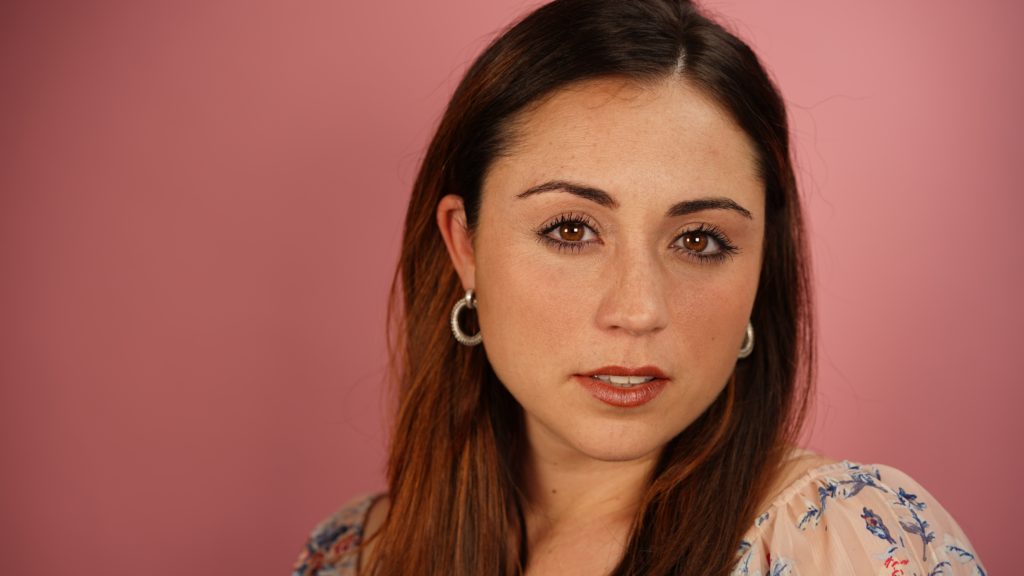
Danene Montella is a Rhode Island-raised, LA-based actress and storyteller. “My adoration for Performing Arts started at a very young age. I think that I was about 7 years old when my parents first showed me a VHS tape recording of Labyrinth by Jim Henson and just like that SNAP, I was hooked on film (and all things David Bowie too),” says Danene.
Whether it had been through dance, sports, or music, I was always involved in performance growing up. During middle school, I was bullied, which deterred me from being a part of school plays, but those harsh times helped shape who I am as a human being. It wasn’t until later in life that I fulfilled my desire to explore acting. Leaving another career behind, I threw myself into scene work and I haven’t looked back.
Since making acting my main pursuit, I have landed several lead roles in films and shorts, including the sci-fi odyssey we’re discussing today, SOLUS. Recently, my team’s #TimesUp short film called CLUB RAT$ – which I co-wrote, starred in and produced with Kill the Pig Productions – has screened at 12 festivals and won 4 awards. I was also honored to accept the award for “Best Actress” at the 2016 LA Short Film Festival in Santa Monica for my role in the short film entitled Fast Hearts.
I’m grateful for my journey so far and look forward to the artistic discoveries, collaborations, and opportunities ahead.
Watch SOLUS TV Series Pilot – A Mythological Sci-fi Adventure Entertainment for Network Syndication
indieactivity : What acting technique do you use?
Danene Montella (DM) : Techniques developed by Meisner and Uta Hagen are the notes with which I play my acting instrument. Similar to musical compositions, every character is wildly unique so my process respects that individuality by preparing for each role using a different combination of tools, like substitution, sense memory and repetition.
Music is also very much a part of my process. For each role, I like to find a song that aligns with my character’s objective to help me sink into the mood. Movement and dance usually accompany this exercise. Writing and acting are not mutually exclusive for me, either. Sometimes I’ll write several pages by hand to unveil a character’s backstory and inner dialogue.
Whichever way I choose to prepare, I have to let go of all of the work once I get on set because the focus becomes fully on the listening at that point. I have to trust that the work I’ve done exists within me.
How did you get connected to the project? Did you have to audition?
DM : In 2015, I had a fortuitous encounter with my co-star Jacob Chattman at his place of work, Trader Joe’s – which I’m convinced is a portal for creative spirits since it was here that the director met Jacob as well. Thanks, TJ’s!
Recognizing like-minded energy, similar east coast ties, and creative talents, we became friends and started to act together in short film projects. In 2017, Jacob introduced me to his writing partner for SOLUS, Jordan Butcher, and they asked me to play the role of Hope based on the skills I brought to the table and the quality of my previous work. Needless to say, I was elated to join the cast of this poignantly written science fiction project.
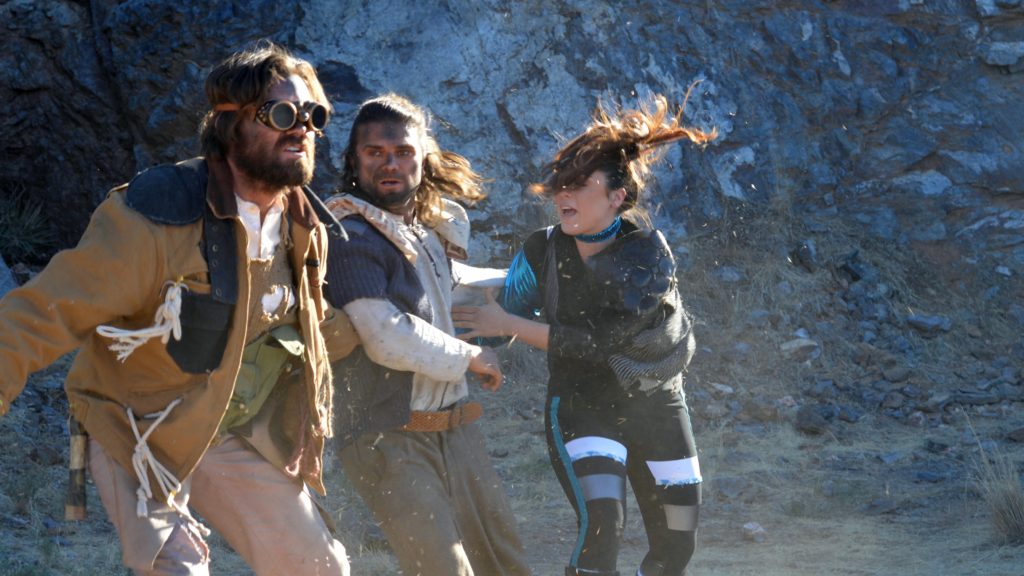
Let’s talk about this series pilot called SOLUS. How did you prepare for such a role? Talk about the script, rehearsal, the physicality of the terrain, the climate, weather, and the demands of the project.
DM : Hope is a clever and intrepid character who faces a great deal of adversity – physically and emotionally – in this sci-fi story. While captured by two strange men, and experiencing sleeping sickness, she’s shaken into a harsh awakening when she learns that she’s been in hypersleep for 1,000 years on a strange planet. A whole lot is happening simultaneously, so diving deeply into the script several times was necessary.
She’s an adept civil engineer with a strong mind of her own so I spent a lot of time grounding her backstory to understand what softness existed within this strong woman – I needed to know what her relationships were like. Most of my energy focused on breaking down the script, refining her inner dialogue, and feeling out the physical manifestations of her character.
Staying in good physical condition was really important since the terrain was rugged and there was a heck-of-a-lot of action involved. I was already taking boot camp classes at the time but in the three months leading up to the shoot, I upped that practice to twice per week paired with hiking and running to train for the shoot.
The cast met with the director, Adrian Carr, and the stunt coordinator, Christian Chan, to rehearse a couple of times before we arrived in Arizona. The goal was to work everything out in advance so that we could make our days on location because time was limited.
In your lead role on the project, how did your ‘choices’ work for you?
DM : I believe that my choices were authentic to the character and her situation but, most importantly, they felt right and allowed me to simply live in the moment. One choice, in particular, helped define Hope’s relationship with her estranged husband, Rafe, which ended up informing the script in a way, which I found to be an exciting revelation.
Hope is also from Rhode Island like I am in real life and, while being from RI was written in the script, I was thrilled to use my understanding of the culture there to make certain choices about her outlook on life.
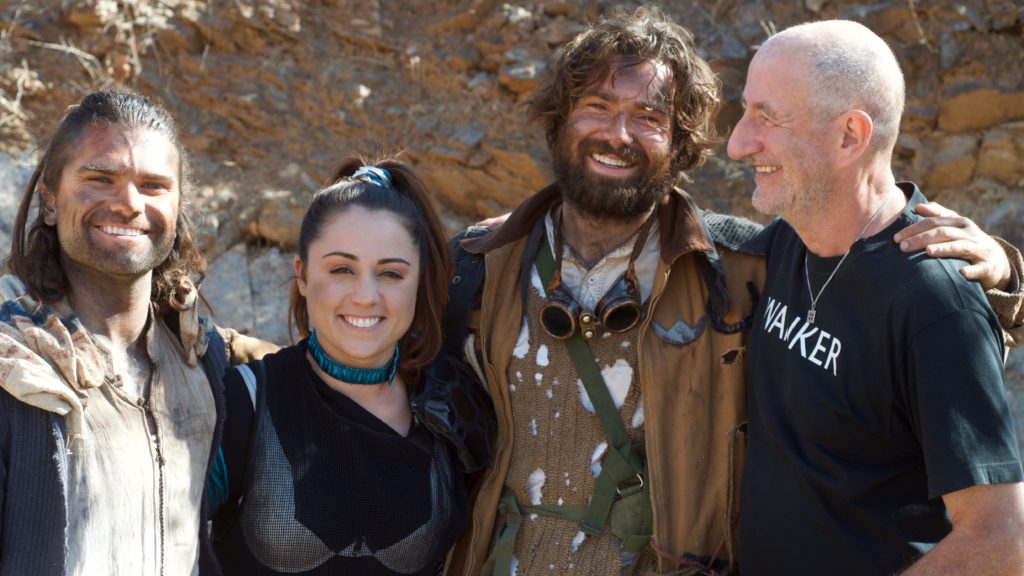
How do you create the character from a script into a person?
DM : No matter which role I’m preparing for, specificity has proven to be the key to realizing a character. Pressing into the specifics of a person’s personality, mindset, youth experiences, fears, physical mannerisms and relationships takes time and that effort is what helps me bridge the gap between myself and another.
What part of the story challenged you when you read it?
DM : The challenge embedded within this role was that my character was going through so much – physically and emotionally – all while experiencing waves of sleeping sickness. I knew that I had to become so familiar with the effects of sleeping sickness that they’d be second nature to me, grounded beneath everything else happening in the script. This was an intriguing and unbelievably fulfilling challenge. I’d do it again in a heartbeat.
I researched the effects of certain altered states that could be comparable to sleeping sickness. I also watched movie scenes performed by one of my favorite actors, Johnny Depp, to prepare for the fainting component of the sleeping sickness – he is the master of fainting in my opinion and was a great source of inspiration.
Explain one creative choice you took on the set of this production?
DM : Just after Hope emerges into the story, she collapses and is captured by the two men who find her. In the script, she wakes up sick and distressed with her hands tied behind a tree, looking for someone named Rafe. I made the choice that she believed that this was all part of some horrible prank. The creators and director were on board and we ended up going with that as her intention at the top of that scene.
You’re not new to indie films. What do you enjoy about the work that keeps you working?
DM : If I were to boil it down to one sentence, I’d say that what keeps me working is that I thoroughly value the liberation I feel when dipping into the complex shadows and light of the human experience. That freedom allows me to acknowledge parts of myself that I haven’t given a voice in the real world, which is as cathartic as it is empowering.
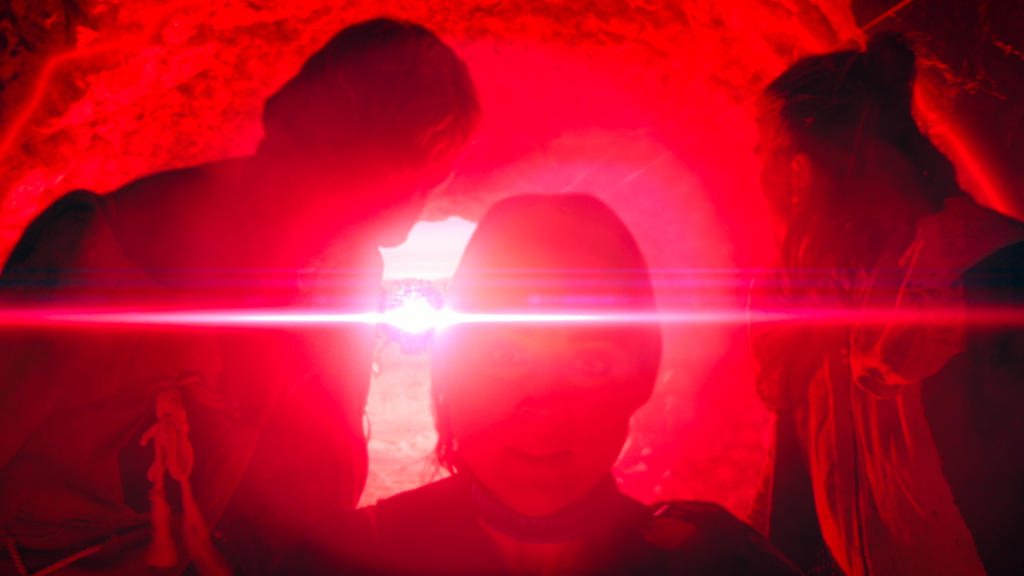
Give an example of a direction you received from the director during the production?
DM : In a suspenseful, “Hail Mary” moment, Hope tries to remember the code to open a hatch door to get herself and the two men with her to safety. When she looks at each of them, she realizes that they are wearing symbols that jog her memory.
We were shooting this scene in a cave and it was a tight space. While in rehearsal, the director emphasized the angles of the shots, which helped us feel confident about coverage. He made sure that we knew where the camera would be. During the first take of my coverage, I apparently reached for my costar’s jacket, pulling the symbol closer to my face, recognizing the symbol. The director liked the action so much that he asked me to do it again in the second take and that’s what ended up in the film.
How did you collaborate with your cast members from scene to scene?
DM : We had limited light exposure each day and, for the sake of time, we didn’t shoot more than two takes of any dialogue scene. That being the case, Jacob, Jordan and I had to trust one another to be ready to go full force before the director gave us our cue. Fostering that level of trust meant that we needed to have faith in one another’s process and treat rehearsals like the real deal. As I knew they would, my co-stars proved to be two of the most generous and prepared scene partners I’ve been paired with for a film project.
For the stunt and fight choreography scenes, we had to have them memorized inside and out before we left for Arizona. We met with Stunt Coordinator, Christian Chan, to make sure that our fight scenes were both safe and engaging so that we could jump right into the action on location, and we did.
As a part of the main cast on SOLUS, describe the feeling of responsibility that shouldered. Were you scared or did it fire you up?
DM : Hope makes her entrance about 20 minutes into the pilot episode, which is the catalyst for major twists, turns, and revelations. Her character is a beacon of “hope” (pun fully intended) for the audience and the plot, which does intrinsically come with a lot of pressure, but I trusted in my work and felt completely fired up in the best way. For me, it’s very empowering to have a big responsibility as a cast member and it’s even more rewarding when you know you’ve shown up for your team with 110% preparation.
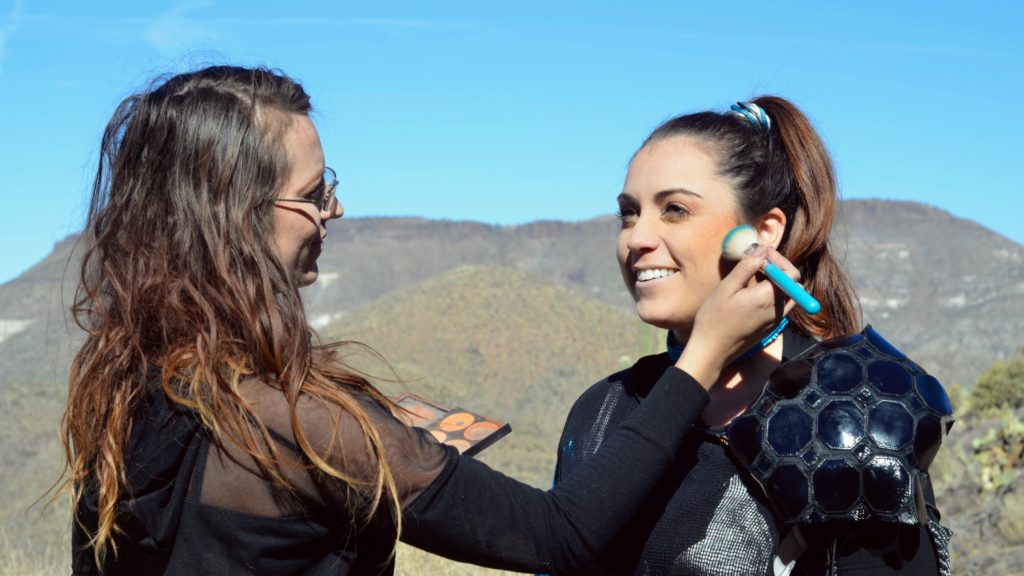
What did you take away from the film production?
DM : This indie production was sincerely a work of art. Witnessing the level of passion, professionalism, and work ethic brought to set by each person involved was nothing short of extraordinary. I consider it a privilege to have worked with this team.
In particular, I felt thankful that I had the chance to work with a handful of female crew members who were new to me: Kirbie Seis (Sound Mixer), Camara Rauen (Costume Designer), Ariel Stafford (HMU), Rosemary Marks (Producer), Grace Thomas (Second AC) and Miranda Calamity (Script Supervisor) and Tamara McDaniels (Line Producer). These ladies showed up with big talent on this production and they were treated with the equality and respect that they deserved. My key takeaway was the feeling of excitement about the future of equal representation and positive work relationships for women in film.
What was it like shooting a science fiction pilot on location in Arizona?
DM : Cave Creek, Arizona is teeming with native history and a powerful spiritual energy – simply being there was an aesthetic adventure. With miles of desert peppered with unique landmarks and drastic terrain as our backdrop, this was a dream location for filming a sci-fi fantasy pilot. I think that I speak for the entire team when I say that the authentic, otherworldly feel of this location facilitated an even deeper relationship to the circumstances taking place in the story. It is very much alive there.
Staying on location for the better part of a week also allowed our cast and crew to expand into a family and the bonding experience was one I’ll look back on and treasure. I’ll especially remember our nightly suppers, where we’d all gather ‘round to share our thoughts about the shoot day and just take time to connect. I felt a camp-like sense of togetherness and I adored every minute of it.
What do you like most about the director and his/her collaboration with his/her team?
DM : Adrian Carr is an experienced and ingenious artist, serving this project as both the director and the editor. Wow, am I right? From intricately drawn storyboards to masterful shot lists planned with Cinematographer, Ross Berryman, the level of effort and thoughtfulness he puts into his creative work knows no bounds. I can honestly say that I have never seen a director prepare as diligently and artistically as he did. He was kind enough to have me over for coffee and let me in on his approach and it was seriously fascinating to see some of his pre-production processes.
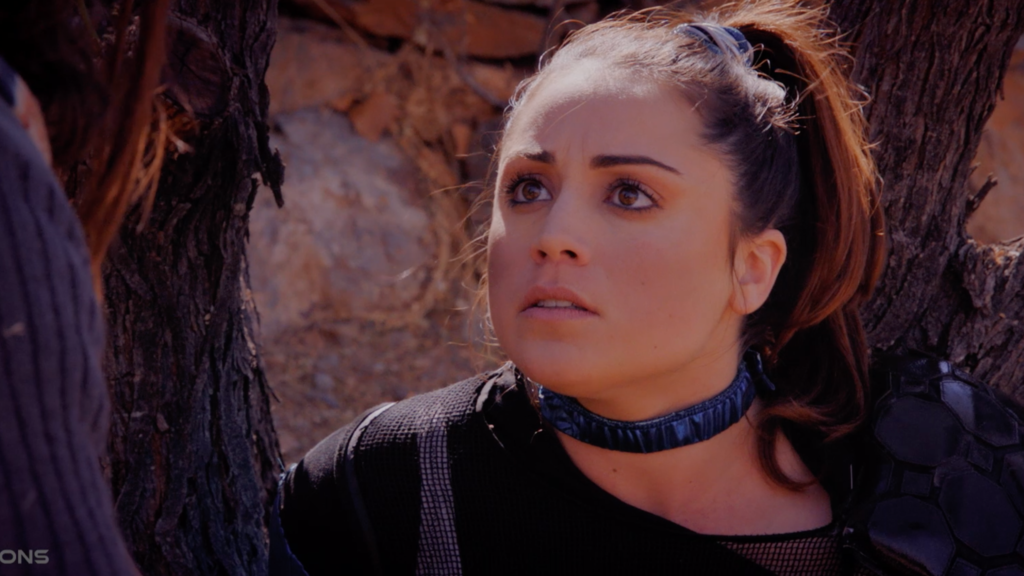
I remember observing how present he was and I was so thankful for that. During rehearsal, Adrian listened intently and valued each actor’s interpretation of the script, making each of us feel like we were seen. He encouraged us to lean into our bold choices, as a true actor’s director does, and his attention to detail kept us inspired. Understanding the importance of establishing a fellowship on set, he made everyone feel welcome, included and, most of all, heard. It was an honor to work with him.
What is next for you?
DM : I’m looking forward to see what happens with SOLUS since our private premiere at ArcLight Cinemas in Hollywood. As an actor, I’m going to continue to focus on what I have control over doing the work.
Other than that, I’m in pre-production for my next short film, Before the Fish Fell, which I wrote with one of my writing partners, Joshua David Bishop. It’s a mystery drama period piece that takes place in the ‘60s and we’ll be starring in it as well.
What advice can you give actors regarding what you learned on the project?
DM : Don’t judge your character; connect with your character. The power of storytelling as an actor is unequivocally in the craft but it also relies on your ability to fully breathe into the circumstances. Don’t be afraid to give yourself permission to feel it all and take risks.
Also, this industry requires a lot of hard work and sacrifice, so work harder than anyone you know and doors will begin to open.
Tell us what you think of the interview with “Danene Montella” What do you think of it? What ideas did you get? Do you have any suggestions? Or did it help you? Lets have your comments below and/or on Facebook or Instagram! Or join me on Twitter @oladapobamidele
Follow Danene Montella on Social Media
Website
IMDb
Facebook
Twitter
Instagram
Richard Green Documentary, ‘I Know Catherine, The Log Lady’: Premiere in NYC, LA May 9th
Lynchian Doc I Know Catherine, The Log Lady Makes Hollywood Premiere 4/17, Rollout to Follow
In Camera by Naqqash Khlalid Launch on VOD April 29
Naqqash Khlalid’s Directs Nabhan Rizwan. In Camera stars an EE BAFTA Rising Star Award Nominee.
2025 Philip K. Dick Sci-Fi Film Festival Award Winners Announced
Vanessa Ly’s Memories of the Future Awarded Best PKD Feature
Dreaming of You by Jack McCafferty Debuts VOD & DVD for April Release
Freestyle Acquires “Dreaming of You” for April 15th Release
Hello Stranger by Paul Raschid set for London Games Festival & BIFFF
The film Is set for an April 10th Premiere at The Genesis Cinema in London (LGF) and BIFFF
Daydreamers Official Trailer by Timothy Linh Bui: Released by Dark Star Pictures
Daydreamers Vietnamese Vampire Thriller – May 2nd release









